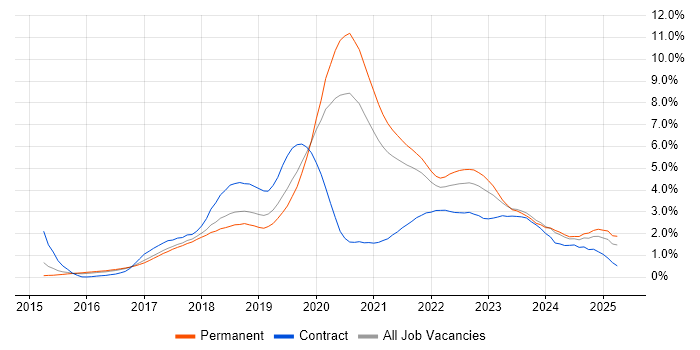Microservices
West Midlands > Birmingham
The table below provides summary statistics and salary benchmarking for jobs advertised in Birmingham requiring Microservices skills. It covers permanent job vacancies from the 6 months leading up to 3 March 2026, with comparisons to the same periods in the previous two years.
| 6 months to 3 Mar 2026 |
Same period 2025 | Same period 2024 | |
|---|---|---|---|
| Rank | 91 | 82 | 67 |
| Rank change year-on-year | -9 | -15 | -22 |
| Permanent jobs citing Microservices | 18 | 37 | 68 |
| As % of all permanent jobs in Birmingham | 0.84% | 2.31% | 3.21% |
| As % of the Processes & Methodologies category | 1.12% | 2.45% | 3.70% |
| Number of salaries quoted | 10 | 21 | 59 |
| 10th Percentile | £42,500 | £53,750 | £52,325 |
| 25th Percentile | £55,313 | £57,500 | £53,750 |
| Median annual salary (50th Percentile) | £67,500 | £70,000 | £65,000 |
| Median % change year-on-year | -3.57% | +7.69% | +8.33% |
| 75th Percentile | £74,688 | £105,000 | £75,625 |
| 90th Percentile | £77,500 | - | £182,500 |
| West Midlands median annual salary | £72,500 | £70,000 | £65,000 |
| % change year-on-year | +3.57% | +7.69% | +8.33% |
All Process & Methodology Skills
Birmingham
Microservices falls under the Processes and Methodologies category. For comparison with the information above, the following table provides summary statistics for all permanent job vacancies requiring process or methodology skills in Birmingham.
| Permanent vacancies with a requirement for process or methodology skills | 1,611 | 1,512 | 1,836 |
| As % of all permanent jobs advertised in Birmingham | 75.00% | 94.50% | 86.73% |
| Number of salaries quoted | 1,151 | 784 | 1,510 |
| 10th Percentile | £32,500 | £38,750 | £31,475 |
| 25th Percentile | £40,000 | £46,250 | £40,000 |
| Median annual salary (50th Percentile) | £55,000 | £58,000 | £55,000 |
| Median % change year-on-year | -5.17% | +5.45% | - |
| 75th Percentile | £70,000 | £73,750 | £67,500 |
| 90th Percentile | £80,000 | £97,500 | £84,964 |
| West Midlands median annual salary | £50,000 | £55,000 | £50,000 |
| % change year-on-year | -9.09% | +10.00% | -4.76% |
Microservices
Job Vacancy Trend in Birmingham
Historical trend showing the proportion of permanent IT job postings citing Microservices relative to all permanent IT jobs advertised in Birmingham.

Microservices
Salary Trend in Birmingham
Salary distribution trend for jobs in Birmingham citing Microservices.

Microservices
Salary Histogram in Birmingham
Salary distribution for jobs citing Microservices in Birmingham over the 6 months to 3 March 2026.
Microservices
Co-Occurring Skills & Capabilities in Birmingham by Category
The following tables expand on the one above by listing co-occurrences grouped by category. They cover the same employment type, locality and period, with up to 20 co-occurrences shown in each category:
